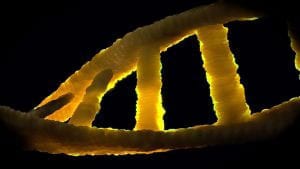I live with a rare, genetic disease called familial chylomicronemia syndrome, or FCS, which prevents my body from breaking down fats and removing triglycerides from my bloodstream. FCS is inherited in an autosomal recessive manner, which means one has to inherit a mutated gene from both parents in order to “get” FCS. So, if both of your parents carry a mutated allele, there is a 25% chance with each pregnancy of a child being born with FCS. I am the only one in my family.
Those of us who live with FCS suffer from extremely elevated triglyceride levels. While a healthy level is under 150 mg/dL, people with FCS have levels of 880 mg/dL or higher. Mine have reached as high as 10,000 mg/dL. If you have excessively high triglycerides, genetic testing can confirm a diagnosis. There are several sponsored testing programs, meaning that you may not have to pay for the confirming genetic test. A genetic counselor can help you find these, and you can find a genetic counselor here: https://findageneticcounselor.nsgc.org/
Growing Up with and Learning to Manage FCS
As a young child, I didn’t think of myself as different. I wasn’t experiencing frequent symptoms, and my parents closely controlled my diet so I wouldn’t feel excluded. For instance, at friends’ birthday parties, I’d be given my own special angel food cake that was lower in fat.
As I became a teenager and started spending more time away from the watchful presence of my parents, I sometimes ate or drank things I knew I shouldn’t, resulting in severe stomach pain.
As I grew older, I started experiencing symptoms more often.
High triglycerides can cause stomach pain, daily fatigue, nausea, and brain fog. Even on my “good” days, it feels like having a mild flu. FCS can be frightening, too, because high triglycerides put me at risk of acute pancreatitis – when the pancreas becomes inflamed, causing severe abdominal pain, nausea, and vomiting – sometimes requiring lengthy hospital stays and even becoming life-threatening. Acute pancreatitis is the worst pain I have ever felt, worse than childbirth, and the possibility that it could occur at any moment and without warning causes intense anxiety.
While I am lucky to have a healthy daughter, my pregnancy and labor were awful. After two attacks of pancreatitis during pregnancy, I was induced six weeks early. My newborn spent 16 days in the NICU, and I suffered another attack right after giving birth, making it nearly impossible to spend time with her in those first weeks. Because of this, I decided not to have more children.
I did find a job I loved – working at a hospital – but the long hours and intense environment made it hard to take breaks when I needed them. Eventually, I made the difficult decision to leave that job and start working behind the scenes at my husband’s store, where I could rest or take days off when I was unwell.
For those of us living with FCS, the only thing we have been able to do to try to keep our triglyceride levels as low as possible was to stick to a diet of less than 20 grams of fat per day – roughly one tablespoon of olive oil – and to not drink alcohol. We also need to stay away from simple carbs and sugar. The diet is tough, but even close adherence to the diet doesn’t always keep one’s triglycerides low enough, and pancreatitis can still occur.
Finding Joy
There are only about 3,000 people with FCS in the U.S., only one person in every 1 or 2 million having FCS, so when I finally met another person with FCS, it was incredibly meaningful. Later, I met someone in their 70s with FCS, which gave me hope for a long, full life.
I was always told there would never be a treatment for FCS because it was so rare. Then, I learned I could participate in a clinical trial. Not only did this give me hope for myself, but also a sense of purpose in helping others with FCS.
When I received my results from the clinical trial, I saw numbers I’ll never forget. After a lifetime of triglyceride levels over 2,500 mg/dL, my number dropped to 700 mg/dL. I was astounded and grateful!
Thankfully the medication I took in the trial was approved by the FDA. It is olezarsen, or the brand name, Tryngolza. I still have to follow a low-fat diet, but many of us never thought we’d have the chance to take something that could lower our triglycerides and reduce attacks. I feel grateful for the research that finally led to a therapy that helps me manage FCS.
Navigating a New Normal
Now, I feel well enough to show up for the people in my life in new ways. With my triglycerides more under control, I’m saying “yes” to plans I used to worry about, not knowing if I’d feel well enough. Recently, I was able to fly cross-country with my husband to babysit our granddaughter. I’m looking forward to the future more than ever before.
AUTHOR:
Genevie was diagnosed with familial chylomicronemia syndrome (FCS) as an infant. For decades, she has lived with FCS, sought research and clinical trial opportunities and found community with others who also live with this rare, burdensome, genetic disease. She is a proud mother, avid runner and advocate for the FCS community.









